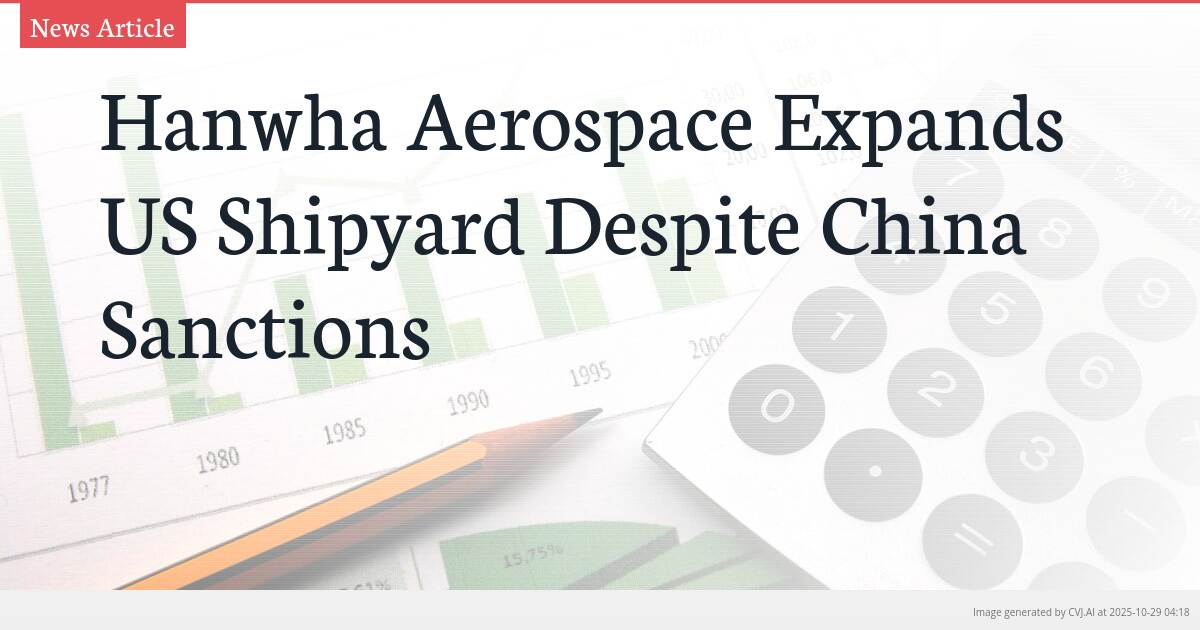This summary text is fully AI-generated and may therefore contain errors or be incomplete.
Introduction
South Korean defense giant Hanwha Aerospace is defying geopolitical headwinds by pushing forward with expansion of its Philadelphia shipyard operations, even as China imposes sanctions on the company’s US-linked units. In an exclusive interview with Bloomberg TV, Global Chief Strategy Officer Alex Wong revealed the company’s dual strategy of pursuing American shipbuilding opportunities while actively diversifying supply chains away from China’s dominant position in critical materials like rare earths refining.
Key Points
- China has imposed sanctions on Hanwha Ocean's US-linked units, creating geopolitical headwinds for the defense manufacturer
- Hanwha Aerospace is actively diversifying its supply chain inputs due to security concerns about over-reliance on Chinese materials
- The company specifically identified China's dominance in rare earths refining as a critical vulnerability for defense manufacturing
Navigating Geopolitical Tensions
Despite China’s recent sanctions targeting Hanwha Ocean’s US-linked units, Hanwha Aerospace remains steadfast in its commitment to American shipbuilding expansion. The company’s Global Chief Strategy Officer Alex Wong, speaking from Gyeongju, South Korea, conveyed unwavering optimism about opportunities in the United States market. This determination comes at a time when many defense manufacturers might reconsider international investments amid escalating geopolitical tensions.
The sanctions against Hanwha Ocean’s US operations represent a significant challenge, yet Hanwha Aerospace’s leadership has chosen to interpret them as validation of the strategic importance of their American investments. Wong’s public commitment to the Philadelphia shipyard expansion signals the company’s confidence in navigating complex international relations while maintaining growth trajectories in key markets.
Strategic Supply Chain Diversification
Central to Hanwha Aerospace’s resilience strategy is an aggressive push to diversify inputs for its defense products. Wong explicitly highlighted security concerns driving this initiative, with particular emphasis on reducing dependence on Chinese-sourced materials. The company’s approach reflects a broader industry trend of reassessing supply chain vulnerabilities in an increasingly volatile global landscape.
Wong specifically identified China’s dominant role in rare earths refining as a critical vulnerability for defense manufacturing. Rare earth elements are essential components in advanced weapons systems, guidance technologies, and communication equipment. China currently controls approximately 90% of global rare earth refining capacity, creating significant strategic dependencies for defense contractors worldwide.
The diversification effort represents a fundamental shift in procurement strategy for Hanwha Aerospace, moving from cost optimization to security prioritization. This transition requires developing alternative sourcing relationships, investing in new processing capabilities, and potentially accepting higher material costs in exchange for supply chain resilience.
US Shipbuilding Opportunities
The Philadelphia shipyard expansion forms a crucial component of Hanwha Aerospace’s international growth strategy. The United States represents one of the world’s largest defense markets, with substantial naval modernization programs creating significant opportunities for qualified shipbuilders. Wong’s optimism about US shipbuilding prospects aligns with increased American defense spending and growing focus on naval capabilities.
The expansion comes amid renewed emphasis on domestic manufacturing capacity within US defense circles. Hanwha Aerospace’s commitment to American operations positions the company to benefit from both commercial shipbuilding contracts and potential defense procurement opportunities. The Philadelphia facility’s growth also supports broader economic and employment objectives in the region, potentially strengthening the company’s standing with US regulatory and political stakeholders.
Wong’s comments suggest Hanwha Aerospace views the current geopolitical environment as creating both challenges and opportunities. While Chinese sanctions create immediate obstacles, they also reinforce the strategic importance of maintaining diverse manufacturing footprints and supply chains. The company’s continued investment in American infrastructure demonstrates its long-term commitment to the US market despite short-term political complications.
📎 Read the original article on bloomberg.com

